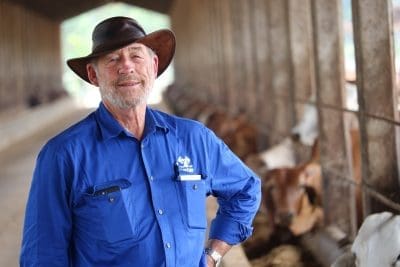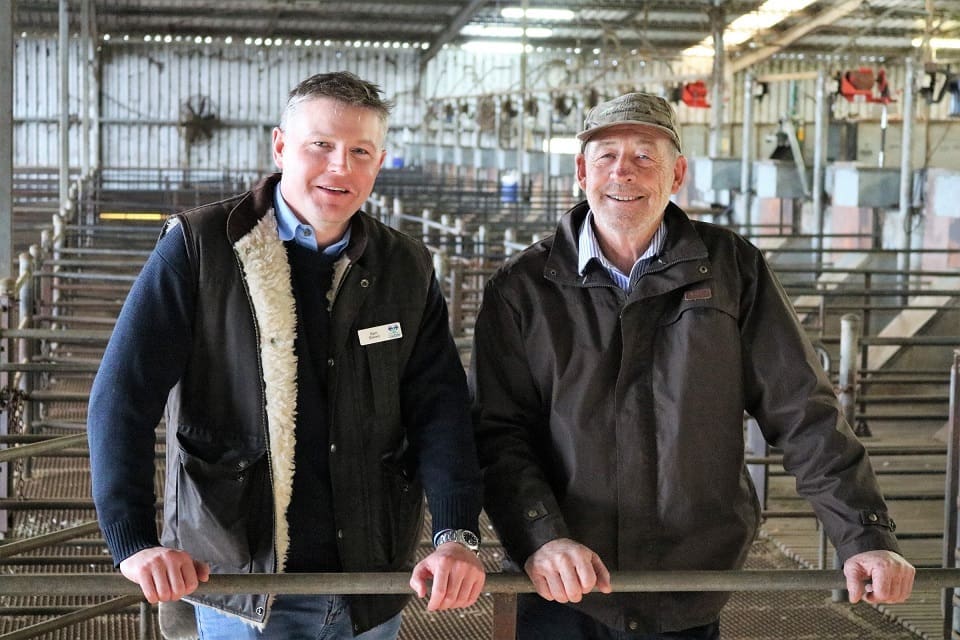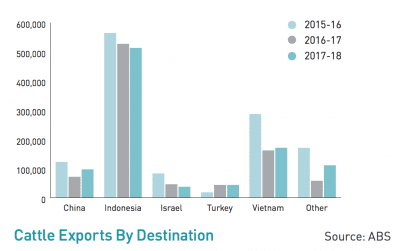THE Australian livestock export trade’s levy-funded marketing and research body Livecorp has released its 2017-2018 annual report ahead of the industry’s annual meetings this week in Adelaide.
In contrast to a budgeted deficit for the year of $469,606, an increase in the overall volume (up 6.4 percent year on year) and value (up 7.2pc) of exported Australian livestock in 2017-18 resulted in LiveCorp recording a surplus of $807,604.
LiveCorp is funded primarily through a levy paid by exporters on the number of cattle, sheep and goats they export.
The annual report attributed the surplus to an increase in operating revenue of $749,921 and a $295,221 underspend of LiveCorp funds in the Livestock Export Program (LEP).
This week’s industry meetings come as the Australian livestock export industry fights to restore crucial public and political support badly damaged by the expose in April of heat-stressed Australian sheep dead and dying on the Awassi Express enroute to the Middle East.
The shocking footage resulted in the suspension and then cancellation of the licenses of the exporting companies involved and an ongoing regulatory crackdown that has impacted Australian sheep export activity since.
LiveCorp’s report indicated the surplus will play an important role in funding new research into animal welfare, particularly focused on improving the measurement and recording of livestock welfare on-board ships.
A new project has been launched to explore the development of scientific animal welfare indicators and the fast-tracking of industry welfare data collection, and the potential to automate the collection of such data, for both sheep and cattle.
LiveCorp says it has also commenced its first Open Innovation project to find technology solutions to manage the on-board environment including rapid cooling, dehumidification, environmental monitoring, enhanced voyage route optimisation and artificial intelligence (more below).
‘Enormous and unprecedented challenges’
 Terry Enright (left), in his first report as LiveCorp Chairman after his predecessor David Galvin stepped-down at the 2017 AGM, described the challenges of the past six months as “enormous and unprecedented”.
Terry Enright (left), in his first report as LiveCorp Chairman after his predecessor David Galvin stepped-down at the 2017 AGM, described the challenges of the past six months as “enormous and unprecedented”.
“There has been a quantum shift in the planning, preparation and oversight of sheep exports to the Middle East,” Mr Enright said in his report.
“LiveCorp has acted quickly to reassess our research portfolio and fast-track projects of relevance and initiate new streams where required, particularly those supporting improved transparency and benchmarking and improvements to the heat stress risk assessment model.”
Mr Enright said the increase in overall export activity for 2017-18 was a reminder of the importance of the live trade for producers and for meeting global demand for livestock.
“LiveCorp recognises the need for the industry to urgently build stronger, more transparent foundations and to unite on its longer-term reform and vision for the future,” he said.
He noted that the industry, by a vote of Australian Livestock Exporters’ Council (ALEC) members, had made a significant and proactive decision in 2018 to unanimously support the implementation of the Livestock Global Assurance Program (LGAP).
“LGAP is an exciting opportunity for the industry – it is at the starting line of where programs like Aus-Meat, Aus-Qual and the National Feedlot Accreditation Scheme stood at their commencement. Their achievements stand as a reminder of what hard work and collaboration can achieve for the live export industry.”
LiveCorp CEO Sam Brown said LGAP would improve animal welfare, and control and traceability within the livestock export supply chain.
“It is a purpose-built program to provide animal welfare outcomes that are equivalent to, or improve upon, those provided by the Federal Government’s Exporter Supply Chain Assurance System (ESCAS),” Mr Brown said.
“LGAP seeks to drive greater efficiencies and effectiveness in delivering its objectives by extending accountability to the facilities in the supply chain, so those that actually own the livestock share the responsibility for ensuring their welfare.”
“Together with the industry, LiveCorp takes its responsibility for good animal welfare seriously. LGAP is an example of our commitment to work closely with exporters to improve standards, and in regaining the community’s trust through ongoing research, development and extension to improve and verify that expectations of animal welfare are being met.”
Mr Brown said the live sheep trade had been called to account for the Awassi Express footage and that the industry needed to demonstrate it could meet community expectations regarding animal welfare.
“Reform is something the industry must get right for the sustainable future of the trade and it is something the industry and every exporter needs to own and carry forward,” he said.
“Important progress has been made across a range of new and innovative approaches to address the issue of on-board heat stress, along with new methods and technologies to monitor, record and report animal welfare measures.”
Sourcing ‘open innovation’
As part of this, LiveCorp has commenced its first Open Innovation project to explore new and emerging technology solutions to manage the on-board environment.
The project has identified a range of potential technology solutions including rapid cooling, dehumidification, environmental monitoring, enhanced voyage route optimisation and artificial intelligence.
“A key research priority has been the large-scale project to determine methods of measuring and recording the welfare of livestock on ships. This includes the development of scientific animal welfare indicators and a fast-tracked industry welfare data collection project,” Mr Brown said.
This work will inform possible opportunities to refine the industry’s Heat Stress Risk Assessment (HSRA) Model, which will help determine the best way to meet the recommendations of the Government’s independent review into the Conditions for the Export of Sheep to the Middle East during the Northern Summer, conducted by Dr Michael McCarthy.
“Industry has a lot of work ahead of it in order to rebuild trust and demonstrate its ability to reliably deliver good animal welfare during shipments,” Mr Brown said.
“LiveCorp is ready to provide the platform of research, development, extension, innovation and support that the industry and exporters need to achieve such an outcome.”
With the future role of Research and Development Corporations under review Mr Enright said LiveCorp had demonstrated in recent months the important and unique role it plays in Australia’s livestock industry.
“Now more than ever, the availability and focus of our dedicated livestock export research program and the role of LiveCorp is proving critical. This is the RDC model at work,” he said.
LiveCorp’s 2017-2018 Annual Report can be viewed here: http://www.livecorp.com.au/LC/files/e1/e13a7bb7-e42b-42db-8195-1f9078291976.pdf


